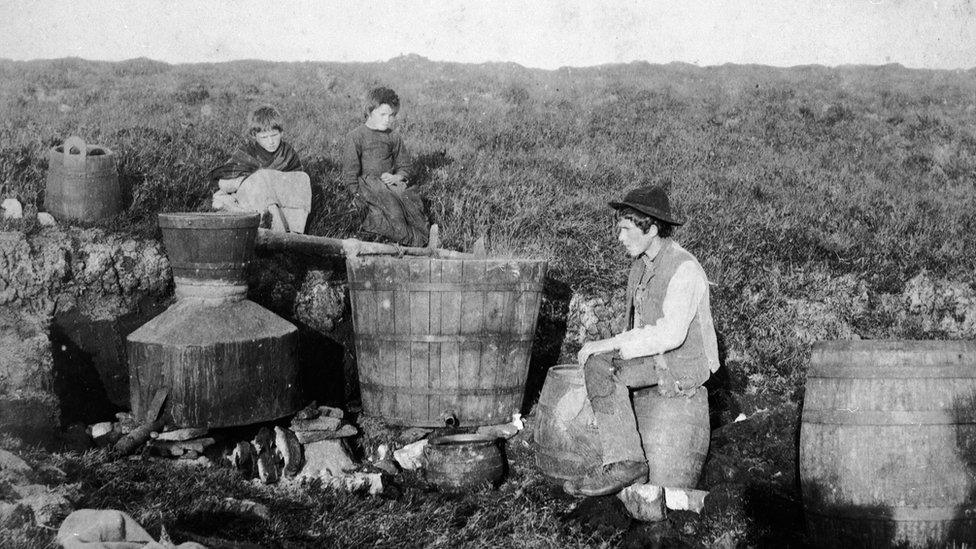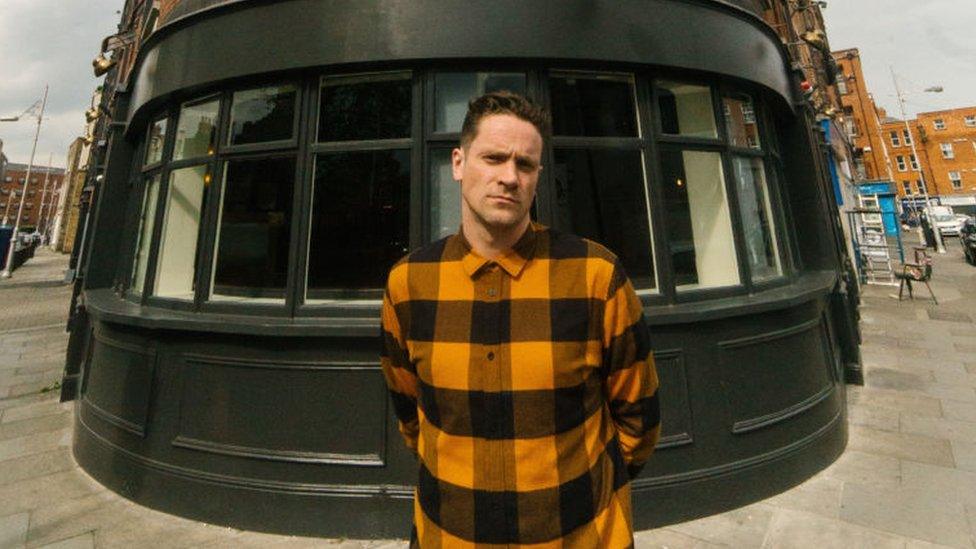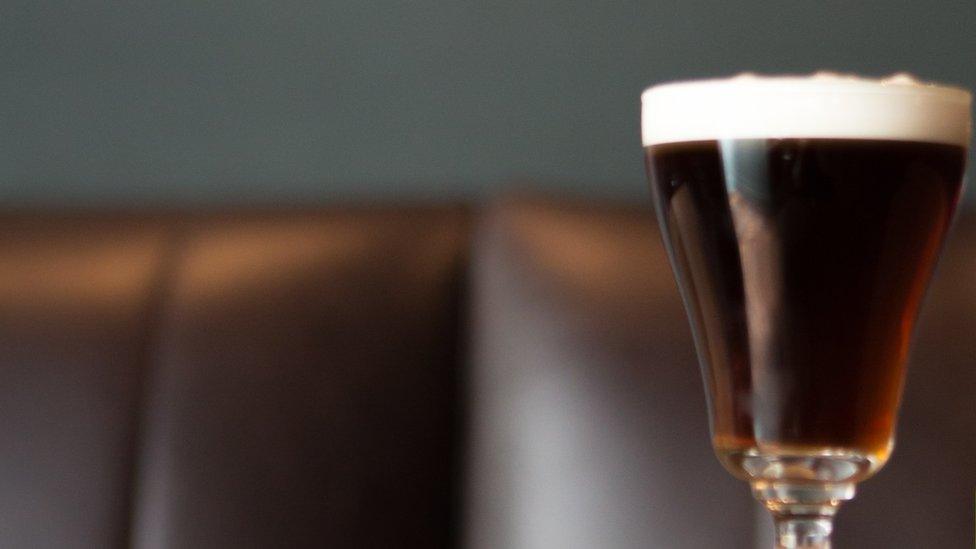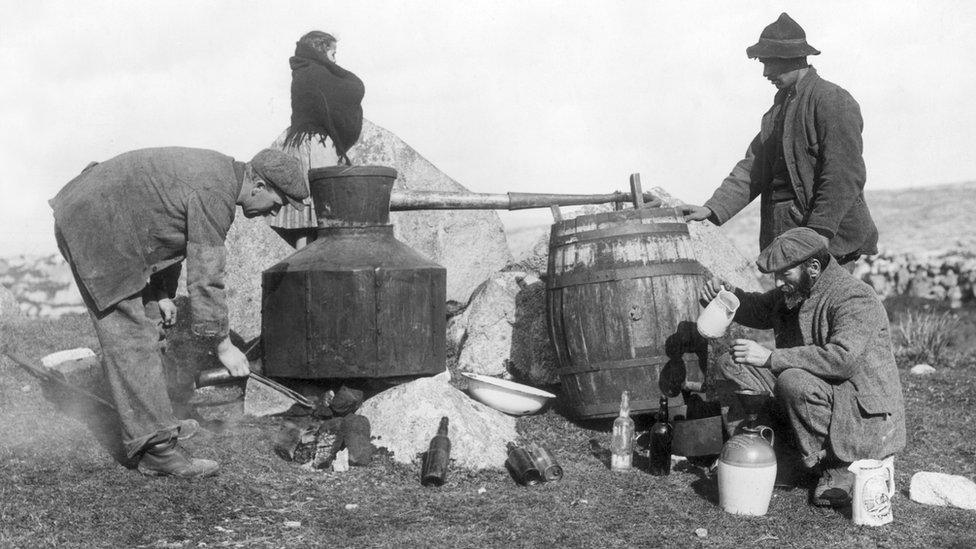Poteen: New generation 'embracing' the ancient but notorious spirit
- Published

Poteen production was criminalised for more than 300 years
Traditionally a strong, clear alcoholic spirit, Irish poteen (pronounced pot-cheen) has endured an infamous reputation since its production was outlawed in the 17th Century.
Legalised in 1997, poteen was awarded an EU geographical indication (GI) in 2008, meaning it can only be produced on the island of Ireland.
Under the new UK trade deal with Japan, it could become a valuable NI export.
But its history is still shrouded in folklore, mythology and controversy.

Poteen expert Dave Mulligan says the spirit is much more than just cheap whisky
For Dave Mulligan, a poteen expert from Echlinville Distillery in County Down, the chequered past of the spirit often referred to as "mountain dew" has given rise to some misconceptions.
"The most annoying myth for me is that real poteen has to be made from potatoes," he said.
'The daddy of all whiskey'
"Poteen predates the potato by about 1,000 years. Barley is the most important ingredient. Potato, other grains and fruits only came into it because poteen makers had to get around the law.
"When production was illegal you couldn't be malting barley, sending up plumes of smoke for three days at a time. You'd be spotted 50 miles away!"
Mr Mulligan said that while the two spirits have taken very different paths through history and culture, in its simplest form poteen is a white whiskey.
"Poteen is the daddy of all whiskey," he said.
"To write it off as illicit moonshine or cheap whiskey is missing the point. Whiskey came from poteen."
"It was discovered by accident that putting poteen in wooden barrels mellowed out the spirit. Then it was commercialised and regulations were put in place to define exactly what whiskey is."
EU stipulations say whiskey must be aged for at least three years while poteen cannot be aged for more than 10 weeks.

Dave Mulligan's "Belfast Coffee" cocktail made with poteen
Mr Mulligan, who also runs a specialist poteen bar in Dublin, said the drink is enjoying a renaissance in many parts of the world and is being embraced by a new generation of cocktail enthusiasts.
His most popular cocktail is a twist on the classic Irish coffee formula, which he calls a 'Belfast Coffee' - it comprises poteen, cold-brew coffee and whipped cream.
Explaining the cocktail's name, he said: "For me, just like poteen, Belfast is the only city in Ireland that will never be twee. Its got an edge and a character and it's proud of its heritage."
'True native spirit'
Derived from the ancient gaelic words for 'small pot' and 'small drink', poteen is one of the oldest alcoholic spirits in the world and is believed to have originated in the 6th Century, although due to its illicit status there is no definitive record.
Archaeological records show distilling the spirit domestically was commonplace in Ireland in 1400 but, threatened by its inability to collect taxes on the home-brewed spirit, the British government criminalized all production in 1661.
Poteen was driven underground for centuries, though outlawing it did little to hinder its production and a black market flourished, as this BBC archive film from 1962 illustrates.

Illegal poteen production in 1912
But times have changed - poteen's profile continues to rise across the world, marketed now as a premium product for a new generation of culture-conscious consumers.
UK International Development Secretary Liz Truss said the post-Brexit trade deal between the UK and Japan "could benefit NI poteen producers".
While the appetite for poteen in Japan has yet to be fully tested, Dave Mulligan believes the cultural heritage that accompanies the spirit will see it continuing to rise in popularity.
"It's not for everyone, it won't bend its DNA to suit the masses," he said.
"But my life is poteen, it's all I do. I consider it to be our true native spirit."